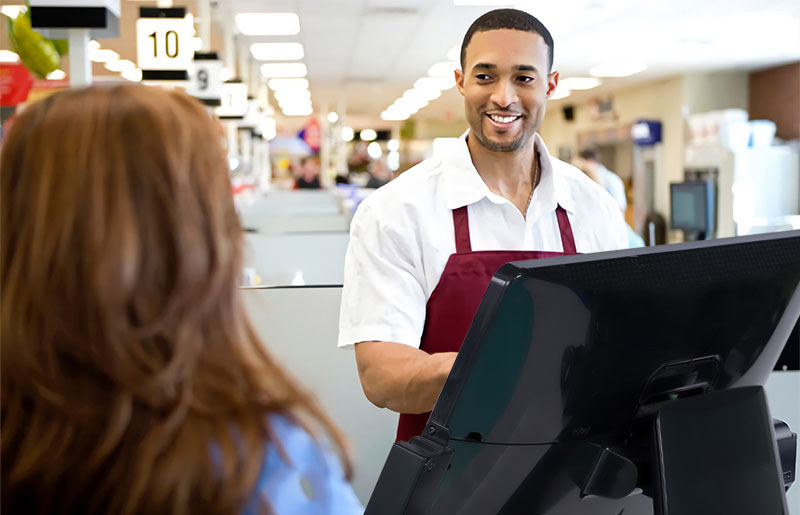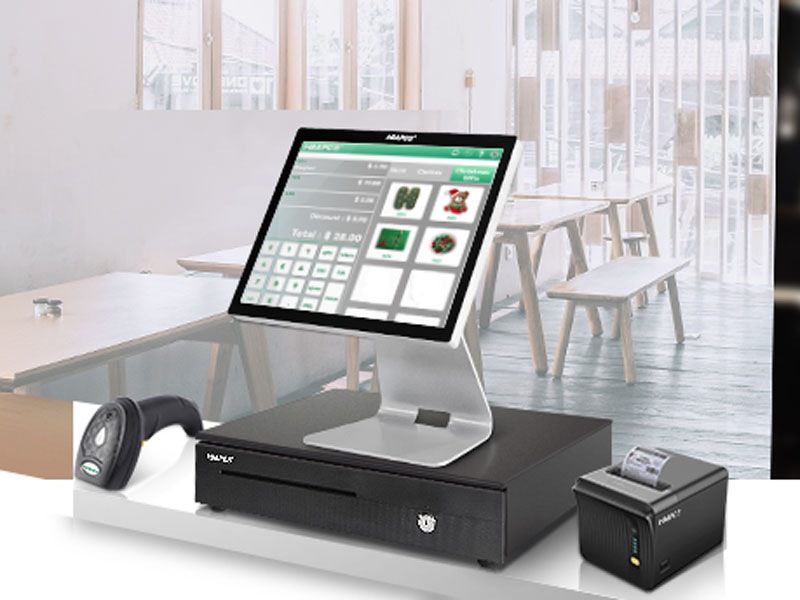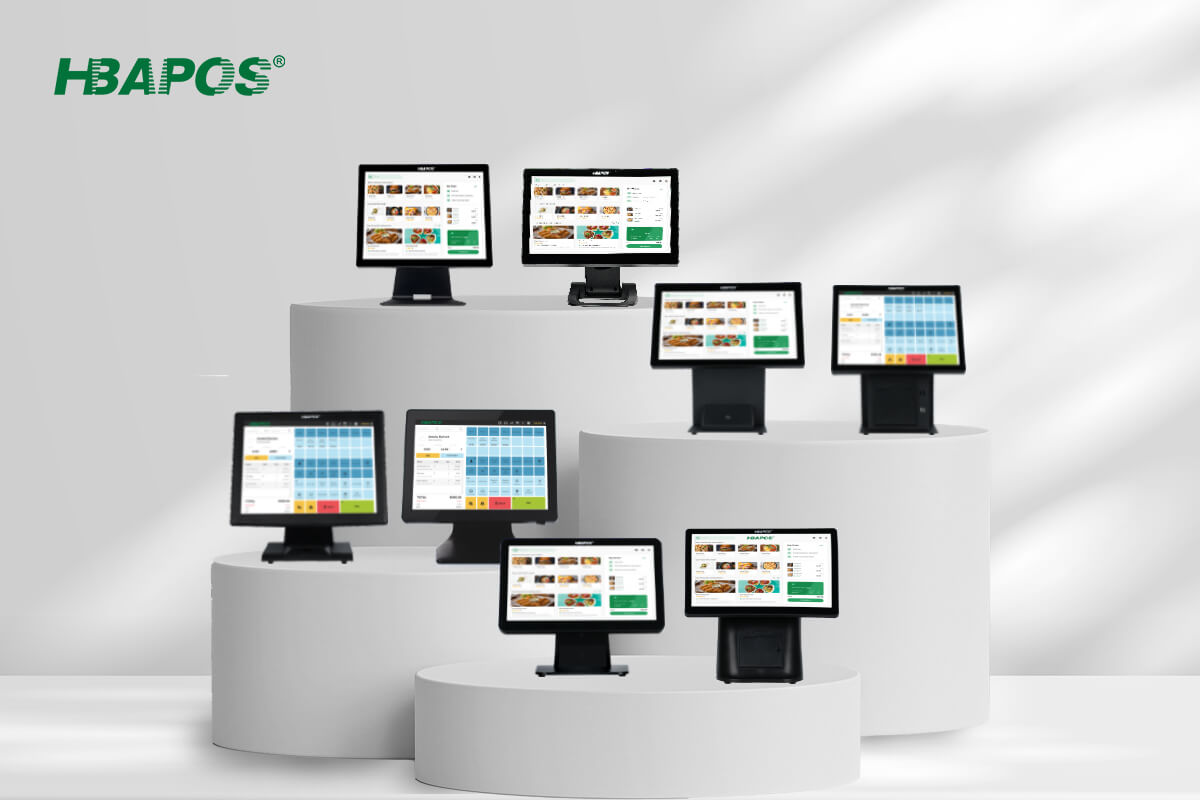What is a Pos System?
Definition of POS Systems
A POS system, also referred to as Point of Sale, is an integrated system that combines functions such as accounting, management, and finance. It brings together cash register equipment commonly used in business transactions, often found in stores, supermarkets, restaurants, and similar establishments to facilitate customer payments, process electronic currency transactions, print sales receipts, generate settlement reports, and more.
This versatile system serves as a hub for various financial and operational tasks, enhancing efficiency and accuracy in transactions across a range of business sectors.
Composition of POS Systems
This pos system is composed of hardware devices such as Pos Machine, barcode scanners, data displays, receipt printers, electronic scales, magnetic stripe readers, cash drawers, information recording and transmission devices, along with corresponding software. It operates through the actual actions of cashiers at the point of sale, where goods are sold to customers, facilitating real-time sales management processes.
Typically, a POS system consists of interconnected front-end and back-end components. It connects the electronic cash register at the storefront with the backend computer through a network. Cashiers transmit data from the sales terminals, including item numbers, quantities, and transaction timestamps, to the backend in a specified manner.
The backend computer then processes comprehensive sales data, storing the results in a server database. This setup allows business managers to access various sales information, such as daily, monthly, and real-time data, aiding decision-making
Furthermore, a POS system can handle non-direct sales activities, including front-end processes like product returns, promotional sales, and inventory checks. This comprehensive approach establishes a front-end system primarily focused on sales operations, with auxiliary handling of other business tasks.
What Can a POS System Do?
Swift Checkouts
A POS system can swiftly process transactions by automatically recognizing barcodes, enabling quick scanning and payment.
Paperless Accounting
The synergy between a POS system and a barcode scanner enables paperless accounting and the individualization of customer accounts. This combination offers valuable support to financial departments, enhancing their capability to track and analyze settlement scenarios effectively.
Pricing and Discounts
POS systems allow for rapid price adjustments, discounts, and promotional offers.
Inventory Management
POS machines play a crucial role in inventory management. They enable real-time monitoring and statistical analysis of products, offering timely and accurate stock information to businesses. Simultaneously, POS machines facilitate seamless transactions, ensuring secure and accurate exchanges. Businesses need to stay updated on product sales to formulate effective procurement and marketing strategies.
Settlement Reports
POS systems intelligently generate billing reports, allowing cashiers and managers to summarize and analyze product sales and monetary flow.
Support for Various Payment Methods
POS systems support multiple payment methods, including cash and bank cards, enhancing convenience for customer payments.
Smart Supply Chain Support
POS systems offer support for intelligent supply chains, allowing businesses to track inventory levels and incoming supplies in real-time, contributing to smarter business management.
Shopping Enhancements
POS systems enable features like product searches, price comparisons, and promotional activities, thereby improving customer experience and confidence.
Incorporating a POS system into your business operations can optimize sales, streamline processes, and enhance overall customer satisfaction.
Advantages of POS System
Security and Reliability
POS systems offer security features such as encrypted transaction data storage and employee authorization controls. This helps prevent data breaches and internal fraudulent activities, ensuring the robust operation of the business.
Expanded Business Scope
POS systems enable remote transactions and management, allowing businesses to adopt various operating models (such as online ordering, franchising, and smart supply chains), thereby broadening their business scope while effectively boosting sales.
Enhanced Labor Efficiency
POS systems introduce self-service electronic payment modes, enabling customers to complete payment independently without requiring in-store cashiers, leading to labor savings.
Improved User Experience
POS systems support mobile checkout and logistics management, facilitating functions like remote inventory transfers, mobile checkouts, self-service inquiries, and Alipay transactions. These capabilities significantly elevate the customer experience.
Enhanced System Efficiency
Relying on computer-based operations, POS systems significantly shorten checkout times, resulting in a substantial increase in overall operational efficiency.
Cross-Channel Integration
Modern POS systems can seamlessly integrate with e-commerce platforms and mobile applications, achieving seamless alignment between online and offline sales.
Types of POS Systems
A Point of Sale (POS) system is an abbreviation for the term “Point of Sale.” There are two main types of POS systems: one is the commercial application POS system (Point of Sales), which serves as a real-time system at the sales point. It is composed of electronic cash registers and computer networks at the store’s front end.
This pos system processes and organizes all transaction information at the retail counter of the store, allowing real-time tracking of sales, data analysis, feedback dissemination, and enhancement of product marketing management.
The other type refers to the POS machine or POS system used in banking applications (Electronic Fund Transfer Point of Sales System). It is known as the electronic transfer service operational system for sales points.
This system is composed of credit card authorization terminals set up by banks at commercial locations or designated merchants, along with the bank’s computer system, interconnected through a public data exchange network
Its primary function is to provide cardholders with the ability to make purchases or expenses at sales points and directly deduct funds or credit the account through the electronic transfer system.
Does a POS System Require the Internet?
Not necessarily. The need for internet connectivity in a POS system depends on specific application requirements and design considerations. Here are some scenarios:
Internet-Connected POS System:
Many modern POS systems come with internet connectivity, allowing them to update product information, inventory quantities, and fetch pricing details from remote servers in real-time.
Internet-connected POS systems can also upload sales data to the cloud, facilitating real-time monitoring and remote management of multiple stores. Furthermore, internet connectivity may enable features like online payments, electronic coupons, customer loyalty points, and more.
Offline POS Systems:
In certain cases, a POS system doesn’t require continuous internet connectivity. Offline POS systems can continue processing transactions even when there’s no internet connection and then sync transaction data to the server once the internet connection is restored.
Offline POS systems are often more suitable for environments with unstable internet or situations where temporary internet connectivity isn’t available, such as remote areas or event locations.
Hybrid POS Systems:
Some POS systems can switch between offline and online modes to adapt to different scenarios. These systems typically synchronize data when there’s an internet connection and still allow transactions in offline mode. In summary, whether a POS system needs internet connectivity depends on the specific needs of the business.
Internet connectivity can provide real-time advantages, but for certain scenarios, offline functionality is essential.
Businesses should choose the appropriate type of POS system based on their operational requirements and goals.

Celline Liao
Marketing Director
Hi, I'm the author of this post Celline Liao.I have beenin this field for more than12 years. If you want toknow more about Pos system or services, please just feel free to contact meany time.




